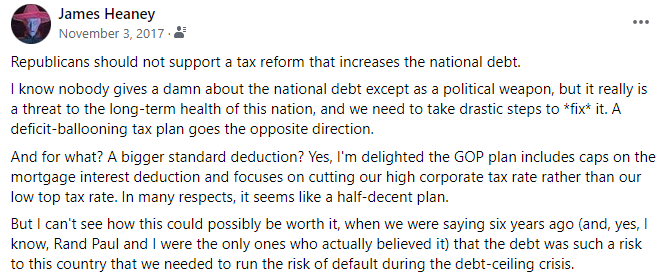The House GOP Should Vote To Increase The Debt Limit Without Concessions
...even though that's the opposite of what a sane and responsible party would do.

Epistemic status: venting spleen in the middle of the day.
The United States national debt is extremely bad. One way or another, sooner or later, the national debt will destroy us. It’s right there in the title of the third-most-popular article I wrote in 2022:
Any sane and responsible political party would consider a balanced budget a top priority, and would be working night and day toward wrestling our deficit down to a sustainable level.1 If we play our cards right, U.S. debt can be back under control within a mere two generations. Any sane and responsible electorate would think the same.
One might think, therefore, that I am happy about the Republican Party’s sudden interest in deficit reduction. They are going to try and force spending concessions on the Democrats in exchange for a debt limit increase! They’re seeking a budget that balances in ten years! Entitlement spending restraints! A $130 billion cut in discretionary spending!2
I am not. The Republican Party is perhaps marginally saner and more responsible than the Democratic Party, because the Republicans pretend to care about the national debt whenever they control Congress but not the White House. So we get some debt brinksmanship theatre every ten years or so. Then Republicans retake the White House, and they spend like credit card thieves on an INTERPOL watch list, which is only slightly less than the Democrats. The Tax Cuts and Jobs Act of 2017 costs over $100 billion per year, and we knew it at the time:
At no time do Republicans contemplate general revenue-raising tax increases,3 even though they are impossible to avoid at this late date. Twenty years ago, perhaps we could have balanced the budget without them. Today, tax increases, including tax increases on the middle class, are going to have to be part of any solution to the national debt—and that solution is going to be extremely painful for everyone.
We do not have sane or responsible political parties, and any sense of responsibility in the electorate has been beaten out of them. It is hard to eat your carrots when everyone else is gorging themselves on dessert. Democrats seem sincerely determined to fly us into a fiscal black hole, promising utopia just past the event horizon. Republicans say they want to avoid the black hole, but they have no credibility, by which I mean they are lying (normal for politicians), everybody knows it (less normal), and we’re all walking around with concrete proof (downright abnormal) because we remember the last two GOP presidencies! The American people are not that stupid! It is possible to underestimate them, and the GOP has pulled it off. (See also: the midterms, in which the GOP ran a rogue’s gallery of knaves and the voters sent them to the curb.)
For their part, the American people were once very responsive to debt concerns (1990s elections were very different from today’s), but now either don’t believe in debt concerns, are past caring, or simply despair. One underestimated reason Trump won the GOP primary in 2016 is because he was the only candidate to guarantee no entitlement cuts to the older voters who were key to his base. Now here’s the GOP, demanding entitlement cuts.
Given all this, the Republican attempt to use the debt limit as leverage is stupid and self-defeating on every level.
Their proposals are too small to be effectual at changing the U.S.’s basic debt trajectory. A 2% spending cut doesn’t even cure this year’s deficit (they get worse throughout the decade). Ten-year balanced-budget plans are always tissues of wishful thinking and lies, which is why I was correct, back in the day, to treat Ron Paul’s budget plan as the only serious plan on offer. Kevin McCarthy hasn’t changed that.4
Because everyone knows the Republicans are lying, they have no moral high ground, their only leverage that of the hostage-taker. It is always difficult to argue for cutting future Social Security benefit increases, even when they are a good idea that won’t hobble current or future seniors. It is downright impossible to do so when everyone can plainly see that you’re willing to take money from grandma but not from the military’s F-35 boondoggle, while taking extraordinary pains to give more money to the nation’s wealthiest taxpayers. The message voters take away is: Republicans hate grandmas. Democrats couldn’t be happier about that.
There are only two possible outcomes from this budget push. These are not exclusive of each other:
Republicans spend enormous political capital on a tense budgetary standoff and go home with nothing meaningful to show for it. Even if they win everything they’re asking for, they still won’t have anything meaningful. They’re eroding their overall popularity for something that even their base (which supported the Trump tax cuts) doesn’t care about or want. If the economy buckles further as a result of austerity, Republicans will end up bearing the blame for a recession that started under Democratic rule. AND/OR
Republicans and Democrats play the debt brinksmanship game too far, refusing the raise the debt limit until after the United States defaults on some of its debts. As explained in my article on the national debt, this could very well bring a major debt crisis down on our heads immediately, not ten or twenty years in the future.
There is no upside to this debt fight, fiscally or politically. Because Republicans are unwilling to get serious and rebuild credibility on this issue,5 they can’t operate effectively on this issue. Since victory in any sense is impossible, Republicans should therefore make this issue go away as quickly as possible. They should surrender to the clean debt limit increase President Biden is demanding, and negotiate only gingerly on the federal budget. That will, of course, leave America on course for the fiscal black hole, but that’s happening no matter what (and confrontation right now, with no plan or possibility for victory, could easily make it worse).
Republicans should instead conserve their ammunition and credibility for legislation in an area that has been a core strength with voters, an area that is arguably as consequential, an area which demands strategic vision and tactical discipline, even though Washington has traditionally treated it as unserious—and, most critically, an area where they could actually score some wins.
That’s right: Congressional Republicans need to pivot to the culture war.6
The budget doesn’t actually have to balance. But the debt has to fall as a percentage of GDP, so that we gradually get on top of our interest payments. It is plausible to me that we could get away with a permanent deficit of $100-$200 billion.
It is always useful to put these numbers in perspective.
“Discretionary” spending is the spending Congress has to renew each year, which covers everything from the War Department to highways funding, school lunches, and NASA. This year, we expect to spend $1758 billion on discretionary funding.
“Mandatory” spending is stuff Congress does not have to renew, mainly Medicare/Medicaid/Social Security. That’s $3674 billion.
“Debt interest” is interest payments on our national debt, which is counted separately from mandatory spending for some reason. That’s $442 billion.
The U.S.’s total spending for this year is expected to be $5874 billion. Meanwhile, our income is expected to be only $4890 billion. We will therefore add about very nearly $1000 billion in debt.
So when Republicans say they are pushing for a $130 billion cut to discretionary spending, that’s only a 2% overall cut, and would still leave us almost $900 billion in the hole this year. At the same time, it would fall mainly on the shoulders of popular programs like NASA and school lunches—slashing them by about 10%, perhaps more if Republicans follow their usual practice of inexplicably exempting the War Department from cuts—which naturally would lead Democrats to raise the usual hue and cry about how Republicans hate children.
(Of course, $1000 billion = $1 trillion—but I am, as always, leaving all figures in billions and giving annual figures only, because most news articles about the budget just expect you to do conversions in your head between billions and trillions and 1-year and 10-year budget windows. I find that incredibly confusing and unhelpful.)
Imposing a cap on SALT deductions was a fantastic move—fiscally, politically, and as a matter of policy—but it was only done to offset some (but not enough!) of the costs of the Tax Cuts and Jobs Act. It wasn’t a revenue-raiser.
He can’t; there’s no political mandate anywhere in the country for serious debt reform.
Repudiating the Tax Cuts and Jobs Act would be a good start. Ending military exemptions from budget cuts would be a good second step.
Bipartisan anti-monopoly legislation would be a solid political + policy win, too, but presumably requires less ammunition.






+1 for ron paul
I gotta be honest. Based on the article title I opened this up champing at the bit to retort the absolute foolishness of continued deficit spending, but was pleasantly surprised to find a more eloquent version of an argument I have been making for several years now. Very well done, sir!